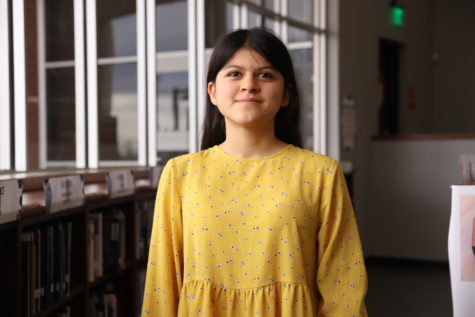LISD teachers advocate for education
Courtesy of Nick Gravois, LISD communications
Caption: (from left to right) Alexis Miller, Amanda McKnight, Curry Goff, Bradley Willi, Bre Manuel, Dr. Lori Rapp, Doug Emery, Donna Friend, Marlene Price, Peggy Hill and Heather Lewis stand by each other on the capitol’s floor on May 4-5.
Superintendent Lori Rapp and 10 former LISD teachers of the year met with Texas legislators at the Capitol on May 4 and 5 during the 88th legislation to discuss issues facing public education. Legislative sessions occur every two years and are held by the House of Representatives and the Senate to draft laws on a variety of topics. The states’ 88th legislative session began on Jan. 10 and will adjourn May 29.
“We’re reaching a point [in] education where things are getting a little scary in terms of funding and the money that we have,” Amanda McKnight, a 2016-17 teacher of the year from Briarhill Middle School, said. “Our district really feels like we need to get down there and make sure that our legislators know that it is imperative that we have what we have and what we need to be able to educate kids well.”

Prior to the trip, teachers signed up to talk to different senators and representatives after the session about a topic of their choice. Rapp said LISD is currently $7 billion short of what it needs to pay off the increasing inflation costs since 2019. In the same year, the Texas House passed House Bill 3, which increased Texas’ basic allotment, money spent to fund each student’s education, from $5,140 to $6,160. It has remained that way ever since, but is not enough to keep up with inflation.
According to the Texas American Federation of Teachers, if basic allotment was adjusted for inflation, schools would be receiving around $7,325 instead. Even if school revenue from property taxes increases, the amount remaining after the basic allotment is paid is sent back to the state through recapture, or “Robin Hood,” which was made to redistribute from wealthy districts to ones with less money. However, if the basic allotment is raised, recapture is lowered.
“One of the things we as a team repeatedly advocated for [was] raising basic allotment,” Donna Friend, the 2014-15 teacher of the year and English department chair, said. “[Increasing it would] allow us to hire more teachers, hire more staff, have smaller classes, [and buy] all the supplies we need.”
The lack of funding makes increasing teacher salaries difficult, contributing to a shortage of teachers, substitutes and teacher aides. Schools are still dealing with the aftermath of teachers leaving their jobs due to low compensation and burnout during the pandemic, otherwise known as the Great Resignation. Amid this time, schools are also struggling to retain teachers of color, who are 10% more likely to leave the profession.
“[Teachers are facing an] invisible tax [with] all of these decisions weighing on [their] shoulders,” Alexis Miller, 2019-20 teacher of the year from Southridge Elementary, said. “These are feelings and real emotional statuses that we feel, but they’re not visible for everyone to see, [especially] for teachers of color. [There is an] issue with retaining teachers of color and making it clear that [having] a teacher of color isn’t just appropriate for a child of color – all children can benefit from having [one] during their K-12 experience. We’re all very passionate about what we do, but that could turn into a burnout because [we’re] trying to give [our] best every day, but then you have people in the community who no longer consider your profession noble as [they] once [did].”
At the meetings with representatives and senators, the group briefly discussed vouchers, which divert funds from public schools to private schools, standardized testing and book censorship. The importance placed on standardized tests in determining a student’s future and their memorization-based structure of the grading system make some believe it does a bad job at measuring achievement.
“We understand why there is standardized testing,” McKnight said. “We understand the importance of making sure that everyone is hitting learning targets and growing the way that we want them to. What we oppose is that we put so much pressure on those tests.”
The teachers discussed misconceptions about public education in social media, including the types of books and things they teach in their classrooms. Friend said she believes it’s important to invite legislators to classrooms to observe what truly happens.
“When you look at social media and you listen to the news and see what’s out there being said, [there’s a negative outlook] about what teachers are doing in classrooms,” Friend said. “It’s also very wrong. There are some that think we’re teaching whatever we want to teach, that we’re not following the state curriculum, and we’re not doing that.”
Last month, Rapp sent out a letter asking families and teachers to write to legislators. The trip was Rapp’s third visit to the Capitol, the second being during a rally day on February 27. The event was organized by the Wylie ISD council of PTA’s to advocate for funding schools based on enrollment, the removal of vouchers, teacher shortage, mental health and the grading system. The teachers said speaking out about important issues has made them realize they can make a real change.
“The best way for legislators to make these important decisions that they get to make about how we educate future Texans is to be as informed as possible,” Friend said. “If they want to make those good decisions, then they need to have those relationships with educators so [that] they can know what’s truly going on in classrooms, what we need, what we don’t need, what students need [and] what [their] situations are.”

Sophomore Daniela Perez is a reporter and this is her first year on staff. She enjoys reading, writing and drawing.



